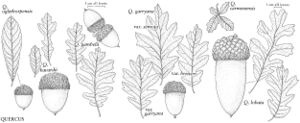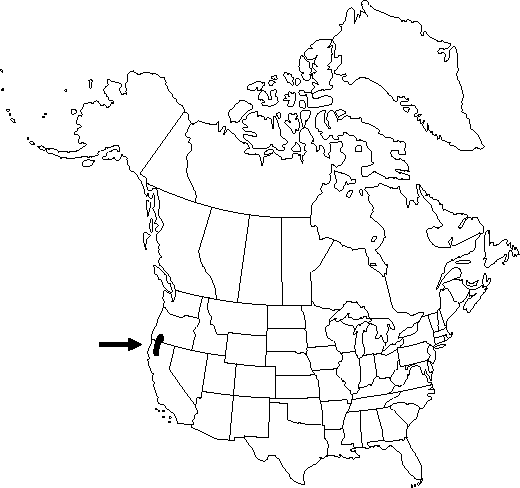Difference between revisions of "Quercus garryana var. breweri"
Fl. Calif. 1(2): 354. 1909.
FNA>Volume Importer |
FNA>Volume Importer |
||
| Line 15: | Line 15: | ||
}} | }} | ||
|basionyms={{Treatment/ID/Synonym | |basionyms={{Treatment/ID/Synonym | ||
| − | |name= | + | |name=Quercus breweri |
|authority=Engelmann | |authority=Engelmann | ||
}} | }} | ||
| Line 33: | Line 33: | ||
|elevation=1400-1900 m | |elevation=1400-1900 m | ||
|distribution=Calif.;Oreg. | |distribution=Calif.;Oreg. | ||
| − | |discussion=<p>Quercus garryana var. breweri appears to be endemic to the Siskiyou region of California and Oregon; it may extend into the northern Sierra Nevada of California. Specimens sometimes placed here from the Coast Ranges of northern California are probably shrubby forms of Q. garryana var. garryana or hybrids between the latter and Q. durata (see treatment). It should be noted that key characteristics separating Q. garryana vars. breweri and semota from var. garryana (clonal habit, smaller, glabrate, brown buds, montane habitat of the former two varieties) suggest a relationship of these two varieties with the Rocky Mountain Q. gambelii. The latter species has smaller fruit than Q. garryana, but the extent of variation in this characteristic in Q. garryana var. breweri is unknown.</p> | + | |discussion=<p><i>Quercus garryana </i>var.<i> breweri</i> appears to be endemic to the Siskiyou region of California and Oregon; it may extend into the northern Sierra <i>Nevada</i> of California. Specimens sometimes placed here from the Coast Ranges of northern California are probably shrubby forms of <i>Q. garryana </i>var.<i> garryana</i> or hybrids between the latter and <i>Q. durata</i> (see treatment). It should be noted that key characteristics separating <i>Q. garryana</i> vars. breweri and semota from <i></i>var.<i> garryana</i> (clonal habit, smaller, glabrate, brown buds, montane habitat of the former two varieties) suggest a relationship of these two varieties with the Rocky Mountain <i>Q. gambelii</i>. The latter species has smaller fruit than <i>Q. garryana</i>, but the extent of variation in this characteristic in <i>Q. garryana </i>var.<i> breweri</i> is unknown.</p> |
|tables= | |tables= | ||
|references= | |references= | ||
| Line 47: | Line 47: | ||
|parent rank=species | |parent rank=species | ||
|synonyms= | |synonyms= | ||
| − | |basionyms= | + | |basionyms=Quercus breweri |
|family=Fagaceae | |family=Fagaceae | ||
|phenology=Flowering late spring–early summer. | |phenology=Flowering late spring–early summer. | ||
| Line 57: | Line 57: | ||
|publication year=1909 | |publication year=1909 | ||
|special status=Endemic;Selected by author to be illustrated | |special status=Endemic;Selected by author to be illustrated | ||
| − | |source xml=https://jpend@bitbucket.org/aafc-mbb/fna-data-curation.git/src/ | + | |source xml=https://jpend@bitbucket.org/aafc-mbb/fna-data-curation.git/src/8f726806613d60c220dc4493de13607dd3150896/coarse_grained_fna_xml/V3/V3_1024.xml |
|genus=Quercus | |genus=Quercus | ||
|section=Quercus sect. Quercus | |section=Quercus sect. Quercus | ||
Revision as of 18:13, 18 September 2019
Shrubs, spreading and clonal, to 2-3 m, multitrunked. Twigs reddish, sparsely puberulent, often glabrate, without spreading hairs. Buds reddish brown, ovoid, 2-5 mm, glandular-puberulent. Leaf blade abaxially light green, velvety to touch, sparsely to densely covered with erect (2-)4-6-rayed hairs 0.2-0.5 mm.
Phenology: Flowering late spring–early summer.
Habitat: Montane conifer forests and chaparral
Elevation: 1400-1900 m
Discussion
Quercus garryana var. breweri appears to be endemic to the Siskiyou region of California and Oregon; it may extend into the northern Sierra Nevada of California. Specimens sometimes placed here from the Coast Ranges of northern California are probably shrubby forms of Q. garryana var. garryana or hybrids between the latter and Q. durata (see treatment). It should be noted that key characteristics separating Q. garryana vars. breweri and semota from var. garryana (clonal habit, smaller, glabrate, brown buds, montane habitat of the former two varieties) suggest a relationship of these two varieties with the Rocky Mountain Q. gambelii. The latter species has smaller fruit than Q. garryana, but the extent of variation in this characteristic in Q. garryana var. breweri is unknown.
Selected References
None.

